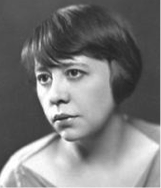 Zoë Akins was an American poet and playwright who won the Pulitzer Prize for one of her plays in 1935. That decade was one of sterling success for her, with many of her plays attracting big names in entertainment and some were turned into Hollywood movies.
Zoë Akins was an American poet and playwright who won the Pulitzer Prize for one of her plays in 1935. That decade was one of sterling success for her, with many of her plays attracting big names in entertainment and some were turned into Hollywood movies.
She was born Zoë Byrd Akins on the 30th October 1886 in the Missouri town of Humansville into a fairly well connected family. Her mother, also called Zoe, was a relative of George Washington and her father Thomas was a leading light in the Missouri Republican Party, serving as state party chairman for a number of years. In the early years of the 20th century the family were living in St Louis and Zoë attended school initially at the Monticello Seminary which was close by in Godrey, Illinois. She then went back to St Louis as a student at Hosmer Hall preparatory school. One of her contemporaries at Hosmer was Sara Teasdale, a girl who would go on to become famous as a poet but who, tragically, later committed suicide.
Akins began her play writing while still at school, her first effort being a parody of a Greek tragedy. She clearly had an ambition to be a full time writer and, after graduating, she produced a number of poems and literary critiques that were published in different publications. As well as writing plays she also acted in some that were put on in the St Louis area.
She wrote a comedy in 1914 called Papa, and even though it attracted favourable reviews it was not successful. What really got her established was a play called Déclassée which attracted a big name in Ethel Barrymore. It was soon labelled “a sensation” and she was, from then on, in great demand as a playwright and screen writer. Unfortunately for her the timing was not great, as the movie industry was going through a transitory period from silent to “talkies”. She had some success, but also some failures.
The 1930s were her heyday with some of her plays becoming big successes on the silver screen. One, which was originally called Morning Glory, was renamed by Hollywood who cast Katherine Hepburn in the movie Stage Struck, and Miss Hepburn won the Academy award for best actress. The Pulitzer Prize for drama finally came her way in 1935 when Akins dramatised an Edith Wharton Story called The Old Maid.
More success followed in this line while, at the same time, she produced poetry with, perhaps, a little less impact. Only two known volumes of poetry can be attributed to her and she generally wrote in a lyrical, often melancholic style. Take the poem I Am the Wind for example, which offers a mournful view of her existence as something that is fleeting, passing over more permanent features. Here is the poem:

It seems that the great praise that was bestowed upon her during the 1930s acted as a kind of brake to her ambitions. She married in 1932 and, soon after, settled to a life of domestic bliss with the occasional foray into writing poetry and plays, living in Los Angeles, which is where her life ended.
Zoë Akins died in her sleep on the 29th October 1958, one day short of her 72nd birthday.

